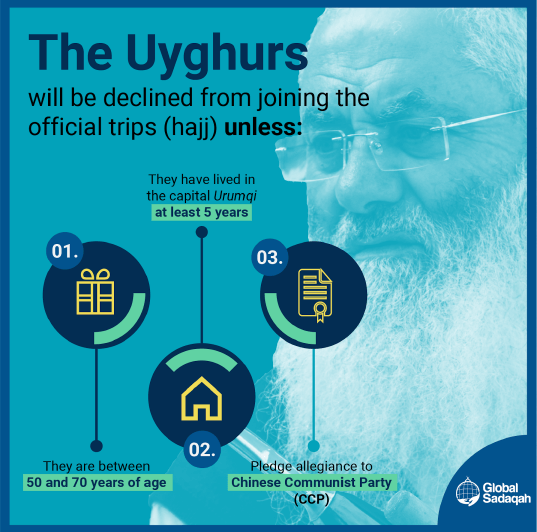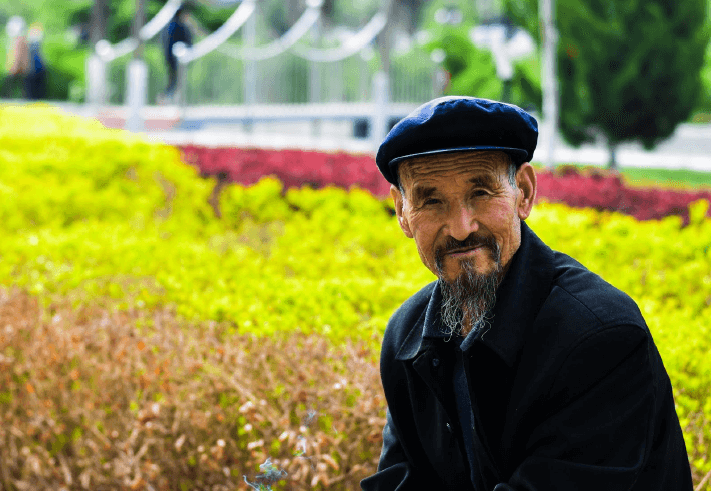Hajj is a religious journey set forth by Muslims to devote ourselves to Allah SWT and inshaallah, a journey in becoming better Muslims as well. This journey is one of the five pillars of Islam and the toughest to fulfil. The pilgrimage to Mecca is only obligatory for adult Muslims who are of sound minds and who are physically and financially capable.
Being announced as a Hajj pilgrim itself is usually an event to be celebrated as the wait to perform the Hajj could be tremendously long. The struggles continue with paperwork and other documents that need to be prepared and submitted for the pilgrimage. Although the processes vary according to countries, the struggles by the Uyghurs from China are always attached to disheartening news.
This year, the number of pilgrims from China stands at 11,500 (1,200 pilgrims lesser than 2017) which consist mainly of the Uyghurs and Hui people. For Uyghurs, they will need to go through a series of state processes in order to perform the Hajj which includes registering at their local Islamic Association. Individuals will be declined from joining the official trips unless they 1) are between 50 and 70 years of age and 2) have lived in the capital, Urumqi at least 5 years 3) Pledge allegiance to Chinese Communist Party (CCP). This age restriction is said to be applicable only in Xinjiang region although the association’s general minimum age limit is 18 years of age.

Amnesty international reported that in 2017, more than 200 Uyghur Muslims who joined religious tours were detained by the Chinese authorities while those who arrange unauthorised religious tours abroad are in the risk of paying up to $29,000 in fines. In addition, the requirement to pledge allegiance to the Chinese Communist Party (CCP) and national unity is not seen in other regional government websites except for Xinjiang region.
This year, Uyghurs who arrived in Saudi Arabia for Hajj were seen with GPS trackers around their neck, a requirement by their government in order to monitor their movements. Each tracker is equipped with individual details to ensure the devices are not exchanged among the Uyghurs. While some view it as a safety measure taken to be aware of their pilgrims whereabouts, one scholar stated that the Chinese government is treating the Uyghurs like criminals, as if they bring the risk of dangerous behaviour.
Why the Discrimination Against Uyghurs?
The Chinese Communist Party (CCP) is China’s ruling political party. They protect and hold strongly to their traditional Chinese identities. Besides the distinct differences of Uyghurs’ traditions and cultural practices from the Han Chinese (largest ethnic group in China), Uyghurs’ resistance to change may be another contributing factor of this discrimination. The Diplomat stated that Like the majority Han Chinese, the Uyghurs also have a strong attachment to their cultural practice and are very prideful of their culture’s long history. Therefore, Uyghurs are not considered as ‘their kind’. Unlike their Hui counterpart, the Uyghurs’ reluctance to alter their way of life and assimilate with the majority, result in the differing treatment and extreme difficulties in practicing Islam. While Hui Muslims can openly practise Islamic obligations such as fasting during Ramadhan, Uyghur Muslims are banned from it under the guise of preventing health issues.
Uyghurs Passport Restriction and Recollection
A passport is the first and the most basic document needed by any citizen to journey abroad. Obtaining the passport marks the beginning of the difficulties Uyghurs have to go through to perform the Hajj. The Chinese government began issuing passports to the Uyghurs in 1970. However, the process became more tedious in 1991 for the ethnic minorities woru a longer and stricter process making it harder for the Uyghurs to go for Hajj.
In 2016 it was reported that millions of Uyghur passports were recalled by the local police, under the guise of an annual passport review of the passports. Failure to comply with the order will result in punitive consequences such as restrictions in travelling abroad. This order was then expanded to Uyghurs living outside of Xinjiang region including those who are living and working abroad. They were required to hand over their passports to the authorities and those who fail to do so will be sent back to Xinjiang. Uyghurs living overseas had troubles with the order as they faced issues in renewing their passports and were pressured to return home by their families due to threats.
The Ones That Got Away and Those Who are Locked Away
Although the Chinese government had taken many measures to restrict the Uyghurs from performing the Hajj, a number of them were able to complete this arduous journey through non-conventional ways.
Middle East Eye published the story of Aishe who performed the Hajj at the age of 16. She went along with her father who was under a working visa in Saudi Arabia. However, upon their return to their hometown in Urumqi, Xinjiang, her father’s passport was confiscated and his work permit was cancelled.
In 2016, one man cycled as far as 8,150 kilometres all the way from Xinjiang to Saudi Arabia to fulfill this religious obligation. Some took an exceptionally long train ride going through Moscow and Istanbul before arriving in Saudi Arabia.
Despite their incredible efforts, these Uyghurs were detained upon their return to Xinjiang. The CCP had instructed actions to be taken on those who were engaged in any form of ‘illegal’ religious activities. A lawyer who lodged a report on the proceedings came upon around 300 Uyghurs who were detained after their pilgrimage. The reason – pilgrimage trips with companies which are not endorsed by the China Islamic Association is an offence.
The future of the Uyghur Muslims is still bleak in Xinjiang. Currently, close to 1million Uyghur Muslims are detained in the re-education camps spread across Xinjiang, just for being Muslims. The Chinese government aims to oppose separatism and Islamic extremism, as mentioned by the state media. Detainees are forced to eat pork, drink alcohol and to denounce oneself from the ethnicity and religion are the common practice in the camps. No significant effort has been done to relief them from the discrimination they are facing in their home country and the number of regulations imposed on them are increasing and becoming stricter as days go by.
May Allah ﺳﺒﺤﺎﻧﻪ ﻭ ﺗﻌﺎﻟﻰ protect them from the harm inflicted upon them in practising our religion. Their strength and determination to perform the Hajj should definitely be an inspiration to those who are privileged to be a pilgrim and to Muslims who practice freely in other parts of the world.
It was narrated that Suhayb al-Rumi said: The Prophet ﷺ said: “How wonderful is the affair of the believer, for his affair is all good, and this applies to no one except the believer. If something good happens to him, he gives thanks and that is good for him, and if something bad happens to him, he bears it with patience, and he will be rewarded for that, so everything that Allah has decreed for the Muslim is good.” [Muslim, 2999. ]
May Allah ease the hardships of our brothers and sisters in Xinjiang, inshallah.

